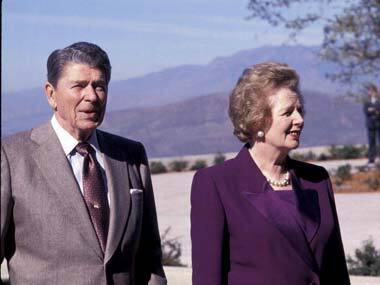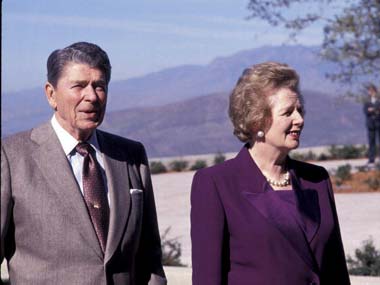- Thatcher was the first and so far only woman to have been Prime Minister of the United Kingdom. She was Prime Minister from from 1979 to 1990. - She was the longest serving Prime Minister of the UK in the 20th century and the second-longest serving of all time, after Tony Blair. - She was born on 13 October 1925. [caption id=“attachment_690643” align=“alignleft” width=“380”]  Margaret Thatcher with former US President Ronald Reagan. Getty[/caption] - Thatcher was originally a research chemist and then a barrister. She was first elected to Parliament in 1959 from the constituency of Finchley. - In 1975 Thatcher defeated Edward Heath for the leadership of the Conservative Party, becoming the first woman to lead a major political party in the United Kingdom. - She married Denis Thatcher in 1951. In her book, The Downing Street Years, she paid tribute to her husband. “Being Prime Minister is a lonely job. In a sense, it ought to be: you cannot lead from the crowd. But with Denis there I was never alone. What a man. What a husband. What a friend.” - She earned the nickname of the “Iron Lady” after a 1976 speech in which she attacked the USSR. “They put guns before butter, while we put just about everything before guns”, she said. In response, the Soviet Defence Ministry newspaper Krasnaya Zvezda (Red Star) called her the “Iron Lady” a description she loved and which came to define her. - In 1984, she surprised the world by saying she liked Mr. Gorbachev, who was then one of the candidates for the General Secretary of the Politburo, the most powerful position in the USSR. Her line that “we can do business together,” became one of her most famous. She is also credited with helping bring down the Iron Curtain, along with US President Ronald Reagan. - Thatcher significantly reduced the power of trade unions, which she felt undermined democracy and economic performance by their penchant for strikes. According to the BCC, she “managed to destroy the power of the trade unions for almost a generation”. - Her most prominent foreign affairs success was the retaking of the Falkland Islands from the Argentinian junta, which ordered the invasion of the islands in 1982. She was widely regarded as a strong and capable war leader. - She was staunchly opposed to integration with the European Union, and that combined with a highly unpopular “poll tax” (a single flat-rate per-capita tax on every adult), led to her being forced to resign as Prime Minister in 1990. - The word Thatcherism has come to describe the politics, economics and social policy of her time in office. It is a world view that champions low inflation through tight control of the money supply, small government, free markets, privatisation and constraints on the power of labour. - In 2005, Thatcher’s daughter revealed that her mother was suffering from dementia. - In 2007, Thatcher became the first living British Prime Minister to be honoured with a bronze statue in the Houses of Parliament. During a brief speech in the House of Commons at the unveiling of the statue, she said, “I might have preferred iron – but bronze will do … It won’t rust.”
Margaret Thatcher was the first and so far only woman to have been Prime Minister of the United Kingdom. She was Prime Minister from from 1979 and 1990.
Advertisement
End of Article


)

)
)
)
)
)
)
)
)



